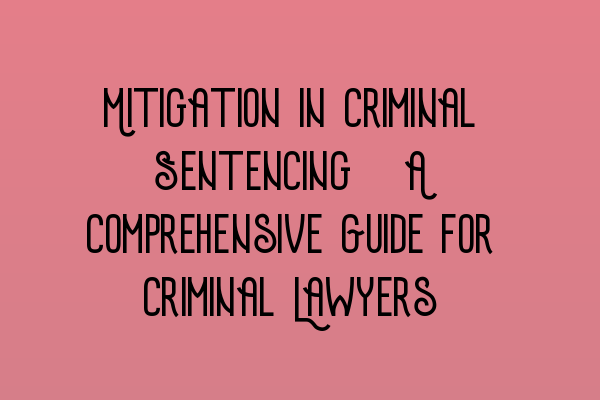Mitigation in Criminal Sentencing: A Comprehensive Guide for Criminal Lawyers
When it comes to criminal sentencing, effective mitigation can make a world of difference. As a criminal lawyer, understanding the intricacies of mitigation is crucial for achieving the best possible outcome for your clients. In this comprehensive guide, we will delve into the various aspects of mitigation and provide valuable insights to help you navigate this critical stage of criminal proceedings.
The Importance of Mitigation
Mitigation is the process of presenting evidence, arguments, and factors to persuade the court to impose a lesser sentence. It aims to humanize the accused, highlight mitigating circumstances, and emphasize the potential for rehabilitation. Effective mitigation can lead to reduced sentences, alternative punishments, or even acquittals in some cases. Therefore, it is vital for criminal lawyers to master the art of mitigation.
Understanding Mitigating Factors
One key aspect of effective mitigation is identifying and presenting mitigating factors. These factors can include:
- Remorse and contrition
- First-time offense
- Cooperation with authorities
- Good character references
- Mental health issues
- Substance abuse
By researching your client’s background and circumstances thoroughly, you can uncover potential mitigating factors that may positively influence sentencing.
The Role of Preparation in Mitigation
Preparation is key to effective mitigation. Conducting thorough interviews with your client and any relevant witnesses will help you gather vital information to build a strong mitigation case. Additionally, exploring sentencing guidelines, case precedents, and relevant legislation can provide valuable insights into potential arguments and strategies for mitigating the sentence.
For comprehensive preparation resources for your SQE exams, check out our related articles: SQE 1 Practice Exam Questions, SQE 1 Practice Mocks FLK1 FLK2, SQE 2 Preparation Courses, SQE 1 Preparation Courses, and SRA SQE Exam Dates.
Presentation and Persuasion Techniques
During the sentencing hearing, it is essential to use effective presentation and persuasion techniques to make compelling mitigation arguments. Presenting evidence and testimonies in a clear, concise, and organized manner can significantly enhance the chance of success. Addressing the court respectfully, expressing sincere remorse, and demonstrating a commitment to rehabilitation can also leave a positive impression on the judge.
Collaboration with Experts
In complex cases, collaborating with experts can strengthen your mitigation case. Experts such as psychologists, addiction specialists, or social workers can provide professional assessments and reports that highlight relevant mitigating factors. Their expertise can lend credibility to your arguments and increase the likelihood of a favorable outcome for your client.
Continued Professional Development
Mitigation strategies and best practices are constantly evolving. Therefore, it is crucial for criminal lawyers to stay updated with the latest developments and legal precedents in the field. Continued professional development, attending relevant seminars or courses, and engaging in discussions with peers can help you sharpen your mitigation skills and provide the highest level of representation to your clients.
For further guidance on preparing for your SQE exams, explore our related articles: SQE 1 Practice Exam Questions, SQE 1 Practice Mocks FLK1 FLK2, SQE 2 Preparation Courses, SQE 1 Preparation Courses, and SRA SQE Exam Dates.
Conclusion
Mitigation is a critical component of criminal sentencing, and criminal lawyers must master the art of effectively presenting mitigating factors. By understanding the importance of mitigation, conducting thorough preparation, utilizing persuasive techniques, collaborating with experts, and staying updated with developments, you can significantly enhance your ability to secure the best possible outcome for your clients.
For more insights and resources on criminal law and practice, visit SQE Criminal Law & Practice Law UK.
